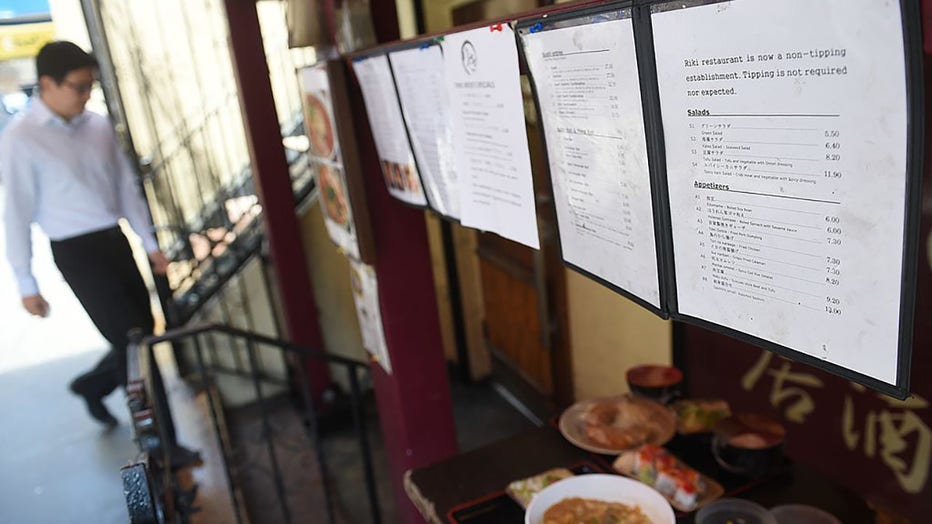‘Kitchen appreciation’ fee? Restaurant diners still facing hidden surcharges

Biden announces crackdown on bank 'junk' fees
Watch: President Biden announces new measures targeting surprise overdraft and NSF fees banks charge people when their accounts go negative.
Hidden fees for things like "kitchen appreciation" or "temporary inflation" have become increasingly common for diners in recent years, particularly post-pandemic.
In fact, a recent National Restaurant Association report states that 16% of restaurant operators have added surcharges to checks.
Sometimes labeled as "hospitality fee," "equity fee," "service fee" or "economic impact fee," these charges are often left off from the menu prices and can surprise customers when it’s time to pay the bill.
RELATED: Why are food prices so high despite inflation falling?
Meanwhile, restaurants are facing higher food prices, increased labor costs, more states raising the minimum wage, a tightening labor market, and consumer price sensitivity – making it increasingly difficult to sustain operations.

FILE - A menu displays a non-tipping policy in front of Japanese restaurant Riki, in New York on May 1, 2014. (Photo credit: EMMANUEL DUNAND/AFP via Getty Images)
"What we are seeing is that there are additional fees being placed at many sit-down restaurants, such as cleaning fees, COVID fees, credit card swipe fees, ranging from 3 to 5%," Shon Hiatt, a USC business professor, recently told FOX 11 Los Angeles. "I think this is going to continue. They're facing major costs and the only way to kind of deal with this, other than raising menu prices which can turn off people from coming to their restaurant, is to add these surcharge fees at the checkout."
Diner complaints over hidden ‘junk fees’ at restaurants
Restaurant customers have complained about the restaurant surcharge trend in recent years, particularly on social media.
A viral post on Reddit revealed the "surcharge offenders" among Los Angeles-area restaurants, which includes a spreadsheet to track which establishments are adding in sneaky fees in addition to normal gratuity.
One popular rooftop restaurant in Downtown Los Angeles recently added a 4.5% "security fee," citing a need to help protect team members and guests, upsetting some customers.
RELATED: Majority of Americans feel frustrated by excessive tipping, leaving less on average: survey
Costs for restaurants are up, too
While customers are facing added surcharges on the bill, the restaurant industry is also feeling the heat of inflation.
Sharp increases in food and labor costs over the last several years have had a dramatic impact on restaurants’ bottom line, according to the National Restaurant Association – which adds how typical independent restaurants operate on very small margins compared to other small businesses.
It says that for every sales dollar, $0.33 goes to food costs, $0.33 to labor, and the remaining $0.29 to other costs, leaving a pre-tax margin of $0.05.
According to the National Restaurant Association's most recent survey, 98% of operators say higher labor costs are an issue for their restaurant this year, and 97% cite higher food costs.
Some 38% say their restaurants were not profitable in 2023.
But despite potentially higher costs, consumers still love restaurants – with 9 in 10 adults saying they enjoy going out for a good meal that they can’t easily replicate at home, according to the National Restaurant Association.
FTC crackdown on hidden ‘junk fees’
Restaurants may soon be required to be more transparent about surcharges added to the bill in a proposed rule announced last fall by the Federal Trade Commission.
In addition to crackdown on hidden fees for everything from booking hotels and resort fees to buying concert tickets online, renting an apartment, and paying utility bills – restaurants and grocery delivery apps are also named in the proposed rule.
The FTC noted how consumer complaints indicated that restaurants "routinely add fees to bills that were not previously disclosed, using various names (e.g., ‘service fee,’ ‘hospitality fee,’ ‘kitchen fee,’ ‘equity fee,’ ‘economic impact fee,’ ‘temporary inflation fee’) that do not clearly or conspicuously identify their nature or purpose."
"Commenters expressed particular concern about the true purpose of restaurant "service" charges, which they expected would go entirely to wait staff," the FTC’s proposed rule states.
"As these comments imply, while a restaurant's management may not keep tips received by its employees for any purposes, no such prohibition exists for service fees imposed by a restaurant," it adds.
The proposed FTC rule would prohibit restaurants and other businesses from advertising prices that hide or leave out mandatory fees, and it would also require businesses to disclose upfront the amount and purpose of the fees – and whether they are refundable, according to the agency.
This story was reported from Cincinnati.

